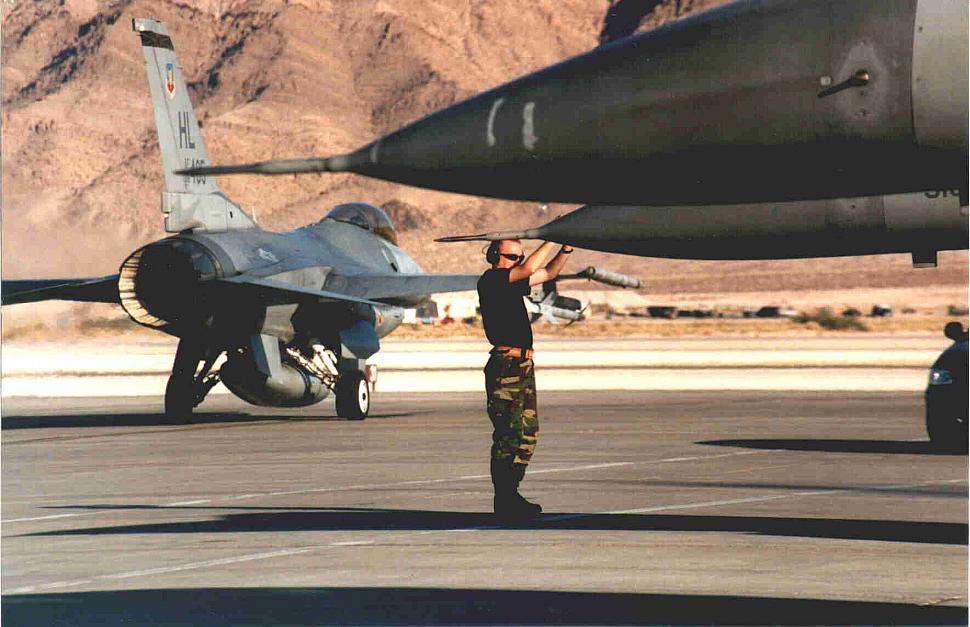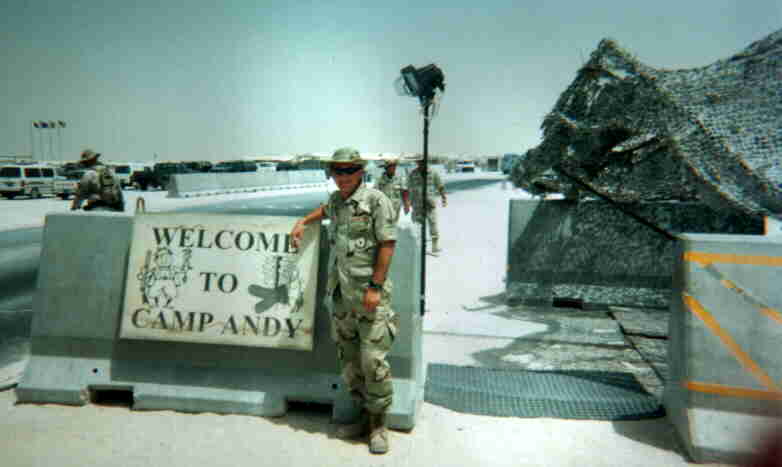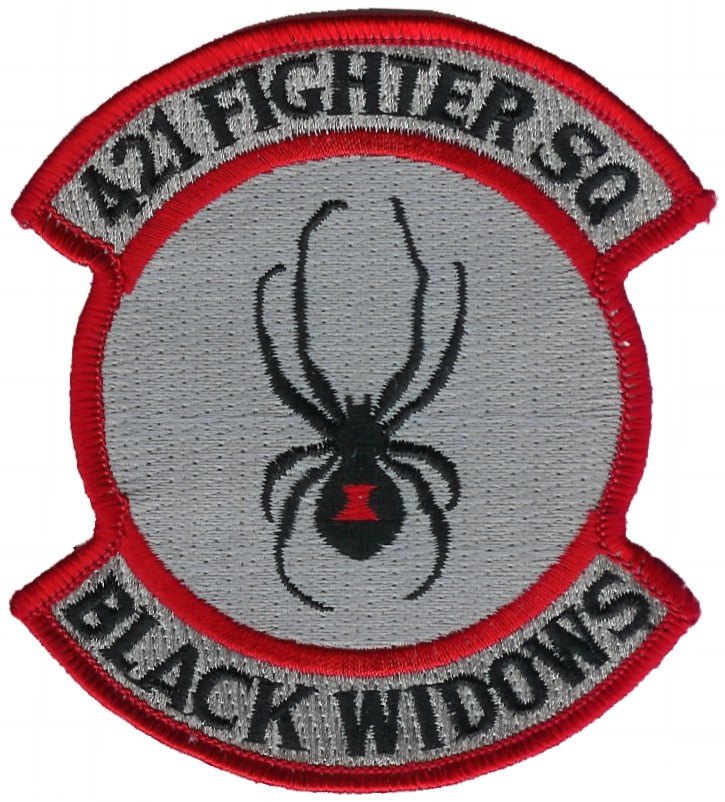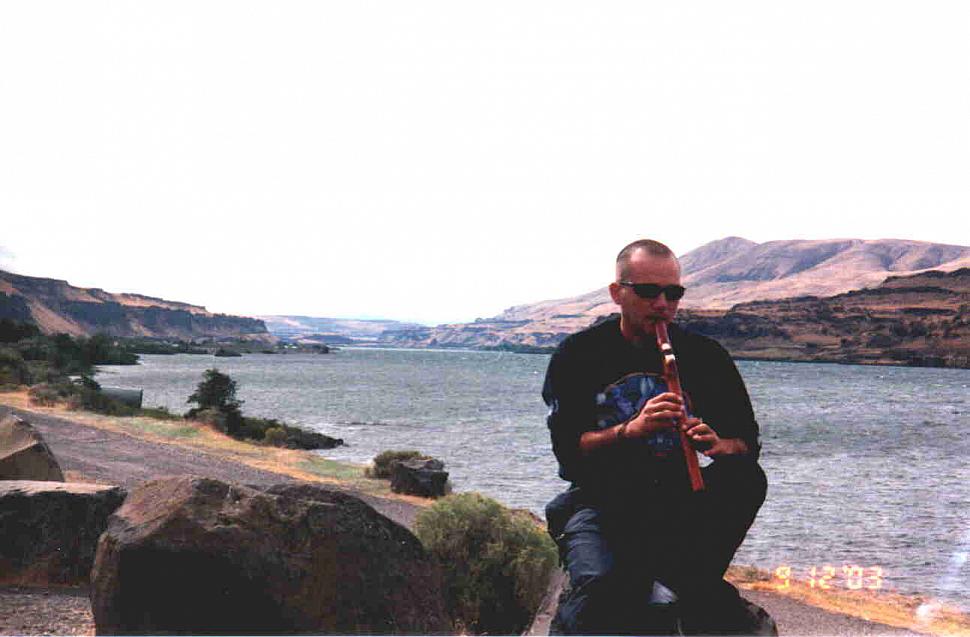
F-16.net: Please give us an overview of your military career and tell the readers a little about yourself?
Gibby: Well I joined up in Jan of 2001. My wife and I had recently married the April before. One of her friends was talking about joining the military as a crewchief and asked what I thought. Being a mechanic by trade and a private pilot. Anyways I joined up and went off to basic, graduated after I pretty much stayed to myself of course! Like with all crewchiefs I headed to Sheppard. Did pretty well, better then I thought. After that went on to Luke AFB. Two weeks later 9/11 happened. Really brought things into perspective of what I'm doing here.
Got out of Luke and my wife and I headed here to Utah. Since then I've participated in Olympic security for the games that were here in Salt Lake City in 2002 flying CAP missions (Combat Air Patrol). May of 2003 I headed to Al Udied AB in Qatar for Operation Iraqi Freedom.
F-16.net: What is your most memorable time out on the ramp working on the F-16 both positive and/or negative?
Gibby: Well I'd have to say the most negative memory I have is while in Qatar we had a jet go down outside of Baghdad, #88-0424. I just remember the sight of only one jet coming back. The expeditor coming down and getting all my tools and such and telling me to get in the truck. The feeling I had when I when the pro super told me that my jet wasn't coming back. Wondering if the pilot made it out. Its something I don't think I'm ever going to forget.
Though the most memorable on a good note (Can't really pinpoint it) I still to this day get chills when I hear the jet start up, the rumble of the ground and air when its at burner and your fairly close to it. Pride I feel when the jet you just spent a 12hr shift fixing breaks ground. I always thought it'd get old. But it doesn't, guess I'm just like a big kid like that.

F-16.net: Gibby, tell us more about what happened after the aircraft went down over Iraq?
Gibby: After the aircraft went down (#88-0424). Of course they confiscated all of my tools and any servicing cart I had used on the jet. Finally after a little bit of waiting in some tiny room we finally heard that the pilot was ok. That he had made it out fine. And luckily enough there was a rescue helicopter that was waiting for fuel off the same tanker that saw him go down. The interviews we had to do, the tests (Blood and urine) and the crash investigation board. Then 3 days after that jet went down the #88-0421 and #88-0516 ground collision incident happened. It was just a REALLY bad month.

F-16.net: What is the hardest thing about working on the F-16?
Gibby: I'd have to say the hardest thing about working on the jet is the tight spaces that they cram some of the components into. Being known as the electric jet and being a fly by wire system there's all sorts of wires and what not running all over the place. So getting the specific thing you want to can be a challenge.
F-16.net: Other than the F-16, what aircraft have you worked on? And how does the Viper compare?
Gibby: Haven't worked on any other aircraft other then the F-16. As I said I am a private pilot. But I don't think that counts.
F-16.net: Any fond memories of a specific deployment or exercise?
Gibby: Well a little past information. I'm known as Bonk on the flightline. I've run into, well jets. Three of them to be exact. Well during an exercise, an ORI (Operational Readiness Inspections) the guys that hand out the kill cards and what not came up and dropped a card on my lap saying I got a head wound. So of course the guys that were around at the time go into action. Calling in on the radio and what not saying that I had a head wound. People didn't know if it was real or fake. And when they realized it was just part of the exercise they were all laughing at the fact that "Bonk" got a head wound.
F-16.net: What are the main challenges of an exercise such as Maple Flag for aircraft mechanics?

Gibby: The main challenges of Maple Flag or even Red Flag or any other exercise for that matter. Least speaking from a crewchief/maintainer stand point is the short turn times, the ODD flying schedules, and the fact where flying 3 or more missions a day depending on what the exercise is. Usually we train with other aircraft from other countries. Or other branches of the service. So our schedule always changes and depends on them. So it can get a bit interesting. Strangest or hardest thing about Maple Flag was the short turn times, and the fact that there were so many different jets there it was hard for the fuel truck drivers to keep up!
F-16.net: Does an exercise such as Maple Flag prepare you adequately for a deployment such as OIF?
Gibby: To a point yes. The ops tempo during an exercise is a bit higher then what where normally used to. That and the fact that where in a different environment. I'm sure for the pilots it does help. Working with other aircraft and countries. But from a flightline standpoint or really any standpoint. I don't think any exercise can adequately prepare you for the stress and pressures of the desert. You just rely more on your training and try and keep your head together.
F-16.net: What assignment/squadron was your favorite?
Gibby: Well as strange as this may sound. The desert was my favorite assignment. The sense of purpose we all had, the camaraderie we had was amazing at times. Something you don't really get day to day on the line, at least not to the extent. Other then that, haven't been in any other squadrons. Hill AFB is my first assignment.
F-16.net: Is there any particular F-16 tail number(s) to which you are fond?
Gibby: I'm fond of the 3 jets I've been assigned to. #88-0476 cause she was my very first jet I had my name on. #88-0428 the Ops group commander jet. My first time on a flagship and that was a good feeling. But nothing tops seeing your name on the canopy and knowing that that's it! So I guess #88-0512 is by far my favorite. After all she's all mine.

F-16.net: What is the best/worst practical joke you played on a victim(s)?
Gibby: Echo checks are always a personal favorite of mine. Basically we tell a new guy to stand at the intake of the jet or climb up inside. While we stand at the exhaust with a Volt/ohm meter or something else that looks all technical. We tell him to yell as loud as he can. Basically the point of our 'echo check' is to measure vibrations through the engine. We get them to change pitch, yell louder, pretty much anything we can think of. Its quite funny, usually get all of the flightline in on it and to watch. Quite a sight.
F-16.net: What advice would you give junior ground crew?
Gibby: Always make it a point to learn something new everyday your out there. You can never stop learning on the line. Always get involved in maintenance. If you hear there's something going on out there, make it a point to go out and at least watch if nothing more. And ask questions!! The 7 levels and the 5 levels that have been around awhile are great sources of information. Biggest thing is, don't act like you know it all straight out of Tech school. That's the biggest mistake you can make...you need to sit back, watch and learn.

F-16.net: Any words of advice to any of our young readers wanting to join the military?
Gibby: Go for it! Its one of the greatest feelings you can get. Knowing your doing something good for yourself or for the country. Whatever your reasons are you'll meet some great people and have some great stories to think back on.
F-16.net: Tell our readers about your musical background?
Gibby: I've been a very musical person all my life. Ever since I was a kid playing a middle school band playing the saxophone. Music has always been in my life. It relaxes me. I got into playing the Native style flute after a pow-wow I went to with my wife. She has always been an admirer of the native culture despite neither one of us having any native in us that we know of. When I first heard the haunting and relaxing sound of the flute I was HOOKED! I had to have one. Too expensive for me to afford for a while so a few years later I tried my hand at making one. Disaster, I met up with a now good friend of mine, Bill. He makes beautiful flutes. When he heard I was going the desert he said I had to have one. We met and he gave me two beautiful flutes. Slowly starting to learn to make them on my own. Time and space restraints getting in the way.
F-16.net: How has your career mixed with your music?
Gibby: Well I took those two flutes to the desert. I was a little bit nervous at first playing in front of the guys I was there with. But I did anyways and they loved it! Often times after work they'd ask me to go play. Mind you after a 12hr day in the 120+ temps. And it was still 120 plus out. But I'd always go. Can't disappoint my "fans". No seriously it would relax them and me at the same time. Nice to kind of get away from the day to day stress of being over there away from family. I remember putting a few of them to sleep a few times. Which to me was the ultimate compliment.

F-16.net: Music requires a lot of practice, how do you manage your military responsibilities with your requirements to practice?
Gibby: True music requires a lot of practice. For me its always come easy, just naturally almost. Its not about managing the military and music. I just play everyday when I get home. Whether its for 5 mins, or for 5 hrs. It just sets my mind at ease and relaxes me. So its more of a mental health thing for me.
F-16.net: Have you released any music onto the music store shelves?
Gibby: No, no music on music store shelves quite yet. Not sure if anyone would buy it. For now its just to play for my own enjoyment and for my family and friends. I do have a few songs put down on a CD. Not sure where my musical "career" will take me. Though I know I'll be playing and hopefully making flutes for many years to come. Maybe one day I'll get some out on the shelves, till then if someone wants a CD of mine. Contact me and I'll be more then happy to send one there way.
F-16.net: How can someone listen to a sample of your music?
Gibby: I have several songs posted on a little personal website of mine: http://www.geocities.com/Flutie_dude. Just click on the little kokopellie (The little flute playing guy) and it will hopefully start playing for you.
F-16.net: Thank you for the interview!
- SA 'Gibby' was interviewed online by Jon Somerville in June of 2004 -
Note: Errors and omissions in the above text can be added here. Please note: your comments will be displayed immediately on this page.
If you wish to send a private comment to the webmasters, please use the Contact Us link.

